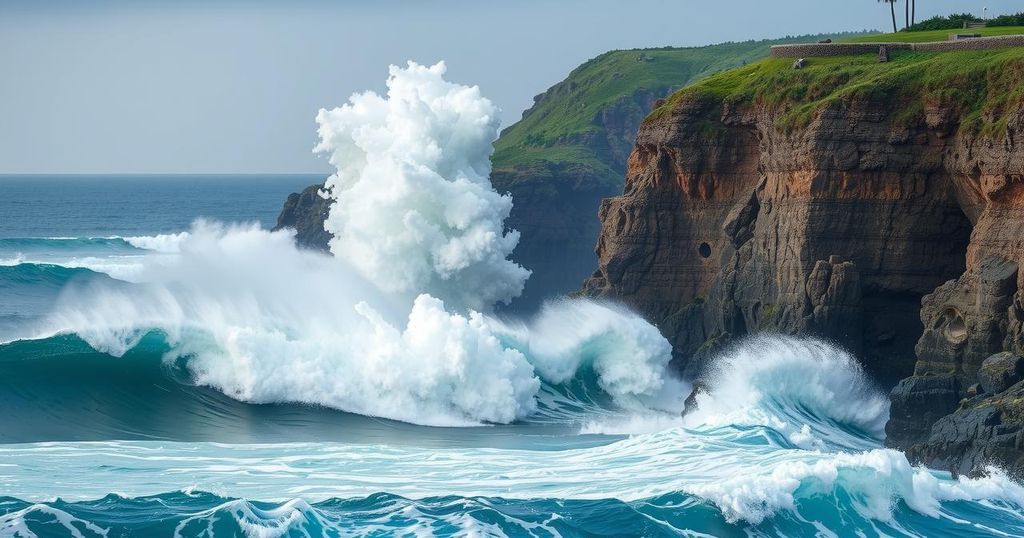Large waves up to 4m have hit Peru, Ecuador, and Chile, leading to three deaths and the closure of nearly 100 ports. Ecuador’s risk management officials warn of similar future events. Fishermen have suffered extensive losses, prompting calls for assistance as many boats remain damaged or lost at sea.
In recent days, coastal regions of Peru, Ecuador, and Chile have experienced devastating conditions caused by enormous waves reaching up to 4 meters in height. Tragically, three fatalities have been reported; two in Ecuador’s Manta region and one in Chile. Such extreme weather has resulted in the closure of nearly 100 ports across these nations, prompting concerns from local officials about the potential for future occurrences of similar events.
Ecuador’s Risk Management Secretary, Jorge Carillo, convened a media conference to discuss the severe impacts of this “extreme event,” emphasizing its unprecedented nature. In Peru, officials indicated that most ports have been shuttered due to the continuous assault of waves, which have led to extensive damage to fishing boats and disruptions to local economies. Enrique Varea, head of the naval Oceanographic Department, projected that while the intensity of the waves might lessen in the coming days, rough sea conditions would persist through the New Year.
The heavy swells have forced residents to evacuate, with images emerging of submerged jetties and public spaces in several coastal towns. The Peruvian Navy reported that substantial wave activity is being generated by high winds off the U.S. coast, leading to widespread beach closures to safeguard public safety. Fishermen, particularly those in the city of Callao, have suffered considerable losses, with reports of around 100 boats damaged and many others stranded at sea. Mayor Roberto Carrillo Zavala of La Cruz district expressed concerns about the potential economic ramifications following these tragic events.
This extraordinary weather phenomenon began shortly before Christmas and is expected to last for several more days, raising alarms within local communities and governments alike. Authorities are seeking assistance for the affected fishing communities, highlighting the dire situation on the ground.
The article discusses the impact of powerful wave systems hitting the coasts of Peru, Ecuador, and Chile, resulting in three reported deaths and significant damages, particularly to the fishing industry. This phenomenon, characterized by waves as high as 4 meters, has necessitated the closure of almost all ports in the region. Local governmental officials are warning of the potential for ongoing extreme weather conditions, emphasizing the necessity of preparedness for future events of similar nature. This scenario revolves around a maritime phenomenon influenced by wind conditions off the U.S. coast, a clear extension of broader climatic disturbances that frequently affect coastal communities in South America.
In summary, the regions of Peru, Ecuador, and Chile are experiencing a severe maritime crisis due to unusually large waves causing fatalities, extensive port closures, and significant economic distress, especially for the fishing sector. The emergency has prompted authorities to warn that similar extreme weather patterns could recur in the near future. As local communities continue to grapple with these harsh conditions, it becomes imperative for governmental and humanitarian aid to respond to the urgent needs of those affected.
Original Source: www.nzherald.co.nz






